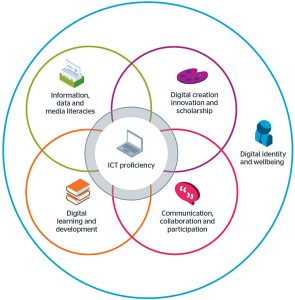Topic 1 was a very interesting topic and it can be also considered as a future of learning in a modern AI world. However, several restrictions and limitations need to be considered before we go for the full implementation of digital literacies. In our team, we have divided digital learning into the following topics:
1- Digital communication:
– Providing multiple options e.g. teams, zoom
2- Digital learning:
– Providing multiple options, online or recorded seminars
3-Digital assessment:
– Anonymizing assessment for the entire group to identify the potential improvement areas

Moreover, we also detected the following challenges:
– Cheating is unavoidable
– Self-motivation is required
– Focuses more on theory
– General Data Protection Regulation

Although online participation and digital literacies have the potential to empower individuals and foster collaboration, however, I think several requirements need to be satisfied for this kind of learning. First, having effective online participation requires the development of digital literacies which encompasses a range of skills, including technological proficiency. In fact, the students require some skills to be more engaged with digital environments critically. The mentioned fact might impact online learning. We need to consider that, we are designing a course for different types of students considering age, general technological skills. Moreover, the availability and quality of digital materials for online learning (such as devices, strong Internet connection, and desktop transfer protocol) need to be considered as well. It might be a case that due to the mentioned factors, an online course has some limitations which can not be used in all countries for different kinds of learners.

On the other hand, the new AI technology such as ChatGPT can also be considered a good starting point for different types of students. In fact, having a user-friendly platform that supports different languages, can help learners to be more ready for online learning.
Wanyun March 23, 2023
Dear Sahar,
Interesting! It’s helpful when a big topic like digital literacy is segregated into the 3 broad areas of communication, content delivery and assessment. Digital assessments is one of the key technologies that my department (CIT) at National University of Singapore support.
Perhaps it’d be great to share more insights on your personal views of the limitations discussed in the group. Looking forward to more posts!
Cheers,
Wanyun
Sahar Tahvili May 22, 2023 — Post Author
Hi Wanyun, sure! the post has been updated 🙂
Selen Savsin March 28, 2023
I totally agree with Wanyun of finding your summary very helpful and neat! I also would love to hear more about both of your experiences on limitations and digital assessments 🙂
Sahar Tahvili May 22, 2023 — Post Author
Thanks, Selen 🙂 the post has been updated now.
Charlotta Edlund March 29, 2023
Your summary of your group’s view of digital learning was very insightful and well structured. How about your own experience in the digital world? Your digital map in regards to being a visitor or resident in various spaces?
Sahar Tahvili May 22, 2023 — Post Author
Hi Charlotta, sure, since my background is in AI, I see already some technologies such as ChatGPT which can be employed also for learning purposes. However, as I mentioned in the current version of the post, Online learning has still some limitations that need to be solved 😉